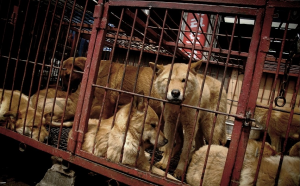Dog Meat: stop the barbaric dog meat trade in South Korea!
By: N Gilbert
A firsthand account of the South Korean Dog and Cat Industry
The $2 billion dollar-a-year South Korean dog and cat meat industry, which extinguishes the lives of approximately two and a half million dogs a year for meat or gaesoju, a dog wine or broth, and thousands of despised and doomed cats for so-called “health” tonics or goyangyeesoju, and soup, operates in a sordid and illicit world where farmers and butchers kill with frightening impunity in the most abominable fashion. Dogs are killed with high-voltage electronic rods (220 volt electrocution to the mouth which does not kill immediately), hanging, or even beating the dog to death at the request of customers who believe that the meat is more tender and tastier the greater the dog suffers (one of the most pernicious of myths) and that the medicinal properties are enhanced. They are most often killed within sight of their cage mates. They are then thrown into a tub of boiling water, often still alive, and then into a rotating drum for the removal of their fur, and finally blow torched. At Moran Market, South Korea’s largest open air-market for dog meat, dog carcasses are on display next to the cages of live dogs. If sales are slow, dogs will remain caged for days or even weeks.
Cats are thrown into boiling water while alive. At the farms, dogs are fed germ-infested, rotting, and fermented human leftovers, a health risk to both the dogs and those who eat them. In South Korea, dogs and cats’ lives are short and ferociously heartless until they tremble no more at the hands of their slaughterers as cage mates look on.
In S. Korea, farmed dogs live for less than a year, often raised in ‘over the ground’ cages. Although these cages are designed so waste can drain away, in reality they are rarely cleaned, resulting in a filthy build-up.
The dogs are usually fed on scraps from neighboring restaurants or – as a WSPA-funded report discovered – even on other dogs, risking the spread of disease. Fighting over the meager food supply causes aggression and injury. The future holds nothing but hours or even days crammed in a small wire transport cage with up to 12 other dogs, heading to market.
According to a groundbreaking television program, with an undercover team of reporters, that aired in South Korea, in 2011, called “South Korea’s Dangerous Health Food—Inconvenient Truth About Dog Meat,” the undercover team spoke with South Korean physician, Dr. Oh, who said that eating dog meat could be hazardous to your health. “These dogs are not fed standard diet appropriate for dogs. Therefore, poisonous substances from these dogs can be contagious to humans. And when these chemicals accumulated in our body, it can cause very serious health problems. Dog meat that is contaminated with germs such as Salmonella is not safe even when you boil or steam it because the germ can survive and cause diseases to humans.”
The South Korean dog and cat meat industry, with its deliberate and indefensible cruelty, is about the implacability of profit and the South Korean government’s granitic indifference to the pervasive rot and stink of human injustice. Dogs are not officially recognized as livestock for slaughter and processing, meaning their meat cannot legally be sold. But enforcement is weak and many dog meat restaurants remain open. But a conflagration is brewing across South Korea and the world that inspires an almost messianic commitment among animal advocates to pursue a ban on dog and cat meat.
A country possessed of an intricate culture soaked with politics and tradition, it recoils when the subject of dog and cat eating arises, experiencing a soul’s unease with the very subject. South Korea is at once the most proud and ashamed, a country in which a sense of a rising global status alongside the ignominy of such cruel practices are indissolubly fused, and whose contradictions and dualities reflect the most exigent of its desires: to be accepted into the world community as an equal and to be without shame about its sordid, corrupt, and technically illegal dog and cat meat industry.
Source: In Defense of Animals (IDA)’s South Korean Dog and Cat Campaign http://www.skdogcatcampaign.org/
World Society For the Protection of Animals (WSPA) http://www.wspa.org.uk/wspaswork/dogs/dogmeattrade/default.aspx
Photo: http://didierruef.photoshelter.com/gallery/South-Korea-2002-Dogs-as-pets-or-as-meals/G0000SXSgv7tqcYM/C0000qWJJfCFzbqQ
There is a complete list of every petition to sign to stop this disgusting vile trade on Korean Dogs. Please visit, sign, and share! These dogs go through torture!
http://koreandogs.org/




No comments:
Post a Comment